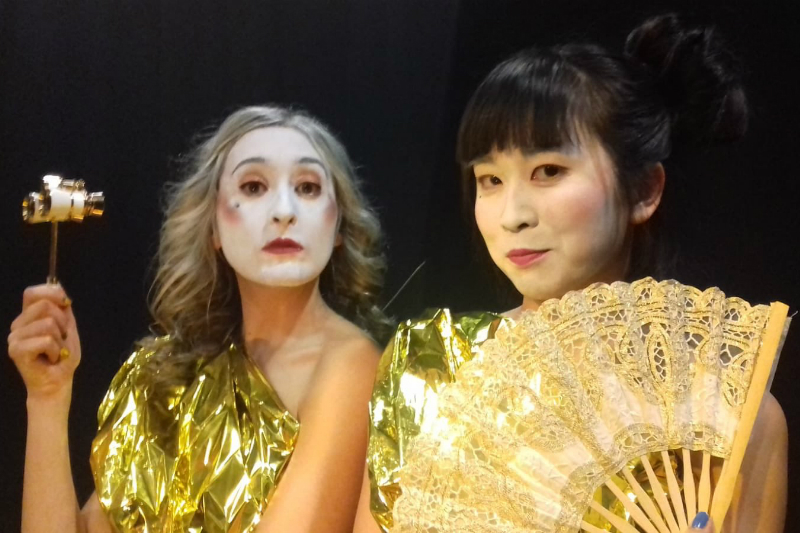Sleepwalk Collective’s latest work, Kourtney Kardashian, is the third part of what the company describe as an ‘accidental trilogy’ which is inspired, in part, by Chekov’s Three Sisters. I haven’t seen the other two parts, a ballet called Kim Kardashian (2016), and a ‘stage play’ called Khloe Kardashian (2017). I am also a bit vague about who the Kardashians are and what they do – but (and this is the point) even though I don’t watch TV or read Hello! magazine, I do know that the Kardashians are immensely famous for being famous, and they pervade all of our lives, staring out from YouTube, uninvited, or pouting from the pages of the Evening Standard left on the train that’s glanced through. The Kardashians in this third show in the trilogy are an oblique presence – a leitmotif, a metaphor, a trope. They represent opulence, luxury, privilege. The allure of fame and celebrity that unsettles us, dragging us further away from the shore.
Kourtney Kardashian is an opera, of sorts. ’Written by the dead, for the dying.’ Is ’the dying’ a reference to the fact that most opera-goers are over 60 and therefore closer to death than birth? Or a philosophical musing on the fact that all of us – 64-year-old me, and my twenty-something companion, and those thirty-somethings behind us, and the performers on stage – are all of us dying, in every moment? Probably both.
The music in Kourtney Kardashian is not just a crucial element of the work – it is also its subject matter. At the start, as is good and right, the conductor (Sammy Metcalfe, behind the upfront sound desk) takes a bow, and prepares. But there is, we are told, no orchestra, and no singers. ‘There won’t be any singing here tonight’ says the diva standing statuesque, centre-stage, in her gold-slash dress. But she’s wrong, there is.
We are given not a version of, but a skirting around, The Marriage of Figaro. There is an Overture and a Prelude and an Interlude; a Cavatina, a Concertato and a Coloratura. There are Arias and Recitatives. The intensely beautiful soundscape includes epic, systems-music symphonic reworkings of Mozart’s ‘opera buffa’; live singing from co-performers iara Solano Arana and Nhung Dang; and crackly recordings featuring Sammy Metcalfe’s parents, Stephen and Lucy Metcalfe, singing the roles of Figaro and his bride-to-be Susanna – all cleverly mulched together. There is a Melodrama, and there is melodrama. There is even a Claque – an ‘organised body of professional applauders’. They are behind us, at the back of the auditorium: two large speakers decorated with gold bows, offering enthusiastic clapping and cheering on command from the maestro at the desk.
The show features many familiar tropes and tricks from the Sleepwalk Collective repertoire. There is text, lots of text, often delivered in the second person, the accusing ‘you’ fired straight out in poetic provocation to the audience, seducing us siren-like on a rolling sea of allusion and alliteration. There are lots of words in this piece, words that work on a semiotic level, above and beyond semantic meaning. I find myself musing on one line that really catches me by the throat, and a whole load more wash over me, in a musical medley of sound. Often with Sleepwalk Collective shows, I love the words, but struggle to remember them afterwards, although I remember the feelings that the words evoke – they bypass my brain and go straight to my heart, little daggers of emotion and soulful meaning. There is a sculptural placing of bodies on stage: statues moving on turntables, duets of gestural choreography.
But most of all there is the voice, the voice – iara’s haunting voice drawing us ever closer to the rocks, taunting us. Opera, theatre, fame, celebrity: all these things here, we are told, but we know anyway – are an illusion. All that glitters is not gold. That ingot of gold, in its velvet box – it’s pretend, right? They are just pretending that they bought an actual ingot of gold for the show, right? She rustles her gold-slash dress, which shimmers alluringly under the lights. It is, we learn, fashioned from a rescue blanket. Nothing is what we really think it is.

